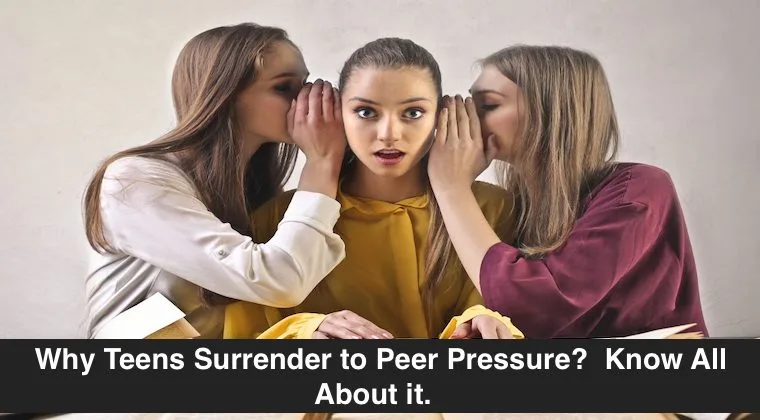+1 845 259 2974 (11 a.m to 7 p.m CST)
Why Teens Surrender to Peer Pressure? Know All About it

Peer pressure is an inevitable part of adolescence, affecting how teens make decisions and behave. It’s a phase where the desire to fit in and be accepted by peers can lead to choices that may not align with their true values. Understanding why teens surrender to peer pressure is crucial for parents, educators, and society as a whole. This article explores the factors behind peer pressure, its impact, and how parental controls can play a vital role in guiding teens through these challenging years.
What is Peer Pressure?
Peer pressure is the influence exerted by peers on an individual to change their attitudes, values, or behaviors to conform to group norms. It can be both positive and negative. Positive peer pressure can motivate teens to excel in academics, participate in sports, or engage in healthy habits. On the other hand, negative peer pressure might push them toward risky behaviors like substance abuse, skipping school, or engaging in harmful activities.
Teens often face peer pressure in various situations, such as when their friends are experimenting with smoking or drinking, or when they feel compelled to dress a certain way to fit in with a particular group. The pressure to conform can be overwhelming, leading teens to make decisions they might not otherwise consider.
Psychological Factors Behind Surrendering to Peer Pressure
Several psychological factors contribute to why teens surrender to peer pressure. Understanding these factors can help parents and caregivers support their teens better.
1. Desire to Fit In: Adolescence is a time when fitting in becomes a priority. Teens want to be part of a group where they feel accepted and valued. This desire can make them more susceptible to peer pressure, even if it means compromising their values.
2. Fear of Rejection: The fear of being rejected or ostracized by peers is powerful. Teens might go along with behaviors they are uncomfortable with because they don’t want to be excluded from their social circle.
3. Low Self-Esteem: Teens with low self-esteem may be more likely to give in to peer pressure. They might not feel confident in their ability to say no or stand up for themselves, making them more vulnerable to negative influences.
4. Influence of Social Media: Social media amplifies peer pressure by creating an environment where teens are constantly exposed to the lives and behaviors of others. The need to gain likes, followers, and approval online can lead teens to engage in behaviors they might otherwise avoid.
The Impact of Peer Pressure on Teen Behavior
Peer pressure can significantly impact teen behavior, leading to both positive and negative outcomes.
- Negative Behaviors: Negative peer pressure can lead teens to engage in harmful behaviors such as substance abuse, risky sexual activities, and delinquency. These behaviors can have long-term consequences, including addiction, health issues, and legal problems. Academic performance may also decline as a result of prioritizing peer approval over studies.
- Positive Influences: Not all peer pressure is bad. Positive peer pressure can encourage teens to strive for excellence, participate in community service, and adopt healthy lifestyles. When surrounded by peers who value education, sports, or creative pursuits, teens are more likely to engage in these activities themselves.
- Long-term Consequences: The effects of negative peer pressure can extend into adulthood. Poor choices made during adolescence can lead to ongoing struggles, including substance abuse, mental health issues, and difficulty maintaining healthy relationships.
How Parents Can Help Teens Resist Peer Pressure
Parents play a crucial role in helping teens navigate the challenges of peer pressure. Here are some strategies that can help:
1. Open Communication: Encouraging open and honest communication is key. Teens should feel comfortable discussing their feelings and experiences without fear of judgment. Regular conversations about peer pressure and its effects can help teens recognize and resist negative influences.
2. Building Self-Esteem: Boosting a teen’s self-esteem can make them more resilient to peer pressure. Praise their accomplishments, encourage their interests, and help them develop a strong sense of self-worth.
3. Setting Boundaries: Clear rules and expectations can provide teens with a framework for making decisions. Knowing that certain behaviors are unacceptable can empower them to say no when faced with peer pressure.
4. Monitoring Online Activity: The digital world can be a breeding ground for peer pressure. Parental controls can help monitor and limit exposure to negative influences online, providing an additional layer of protection.
The Role of Parental Controls in Managing Peer Pressure
Parental controls are tools that can help parents manage their teen’s exposure to potentially harmful content and interactions. These controls can be an effective way to counteract peer pressure, especially in the digital age.
- Parental Controls: Parental controls are software tools or settings that allow parents to monitor and restrict their child’s online activities. These controls can be applied to various devices, including smartphones, tablets, computers, and gaming consoles.
- How Parental Controls Help: Parental controls can help limit exposure to negative influences by filtering inappropriate content, blocking certain websites, and monitoring social media interactions. This can prevent teens from encountering situations where they might feel pressured to engage in risky behaviors.
- Effective Parental Control Tools: There are several parental control tools available. These tools offer features like activity monitoring, screen time management, and content filtering, which can be customized to suit individual family needs.
- Encouraging Responsible Use of Technology: While parental controls are helpful, it’s essential to teach teens responsible technology use. Encourage them to think critically about the content they consume and the people they interact with online.
Encouraging Positive Peer Influence
Parents can also play a role in fostering positive peer influences by guiding their teens toward healthy friendships and activities.
- Choosing Friends Wisely: Encourage teens to build friendships with peers who share similar values and interests. Positive friendships can have a lasting impact on a teen’s behavior and choices.
- Extracurricular Activities: Promote participation in extracurricular activities that align with your teen’s interests. Whether it’s sports, music, or volunteering, these activities can provide a sense of belonging and reduce the likelihood of succumbing to negative peer pressure.
- Teaching Leadership Skills: Help teens develop leadership skills so they can be influencers rather than followers. Encourage them to take the lead in group projects, organize events, or mentor younger students.
Peer pressure is a powerful force that can shape a teen’s behavior, for better or worse. By understanding the reasons why teens surrender to peer pressure, parents can take proactive steps to support their children. Open communication, building self-esteem, and setting boundaries are essential strategies. Additionally, parental controls can provide an extra layer of protection, helping to monitor and manage the influences that teens encounter in their daily lives. Ultimately, with the right guidance and tools, parents can empower their teens to make positive choices and resist the pressures that come with adolescence.





















